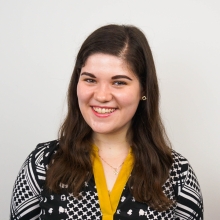
I graduated in 2015 with a bachelor’s degree in Gender, Sexuality, and Women’s Studies and moved to Washington, D.C., where I worked in the research team at EMILY’s List, the nation’s largest resource for women in politics. My time in politics and what I learned through the GSWS program led me to attend law school to use my advocacy skills and passion in a different way. (Click above to read more.)
I graduated in 2015 with a bachelor’s degree in Gender, Sexuality, and Women’s Studies. I moved to Washington, D.C., where I worked in the research team at EMILY’s List, the nation’s largest resource for women in politics, from 2015-18. Later, as a law student, I led my school's reproductive justice student organization and interned with Alliance for Justice, the Virginia Attorney General's Office, the U.S. Equal Employment Opportunity Commission, a federal judge, and a law firm that represents employees in discrimination lawsuits. After graduating from law school in 2021, I have returned to D.C. to clerk for a judge.
I learned valuable skills during my time as an undergraduate in the GSWS department that I use every day. My courses prepared me for the rigors of research in the professional world, and provided perspective on legal matters pertaining to gender, race, and sexuality. I wrote a thesis my senior year on policy regarding the commercial sexual exploitation of women in Pennsylvania, and the time spent learning about different state and local legislation, and why laws were written a certain way or who supported them helped prepare me to work in politics and later decide to attend law school. Learning about the politics and history of women’s health care motivated me to get a job that would work toward the advancement of equality, and gave me useful knowledge of policy issues I read and wrote about all the time working at EMILY's List.
My exposure to academic writing and research through GSWS, as well as the experience of writing a senior thesis, greatly prepared me for law school, where I worked as a faculty research assistant and published my own academic research on absentee voting. A large part of GSWS classes is asking why things are the way they are and how to change them - it is like training to think and interrogate the status quo in a certain way, similar to being a legal advocate. Coming into law school, GSWS had given me the tools to start off as a strong legal writer, researcher, and analyst and continue to build my critical thinking skills throughout my career.

 The Program in Gender, Sexuality, and Women’s Studies
The Program in Gender, Sexuality, and Women’s Studies